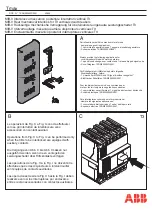
Current Path Resistance Test
Purpose
To measure and record the dc electrical resistance
of the main current carrying pole unit assembly in
the VCP-W power circuit breaker. This measurement
is performed by injecting 100A dc from terminal to
terminal of each pole unit in the closed position and
measuring the voltage drop across the terminals. The
resistance can be calculated from Ohm’s Law and is
expressed in micro-ohms.
The main contacts are inside the vacuum chamber,
which remain clean and require no maintenance at
any time. The design does not have sliding contacts at
the moving stem and use a highly reliable and unique
flexible clamp design that eliminates the need for
lubrication and inspection for wear.
This test may be performed during regular maintenance
intervals and the results should not exceed the factory
recorded values by 15% when adjusted to the same
temperature recorded during the factory tests.
Equipment
This test should be performed with a low voltage,
direct current (dc) power supply capable of delivering
no less 100A dc. The factory performs this test using a
Digital Low Resistance Ohmmeter (DLRO). The DLRO
injects 100A dc, measures the voltage drop across the
terminals and displays the resistance in micro-ohms.
Procedure
The current path resistance test is to be performed per
ANSI/IEEE C37.09-1999 section 5.15.
Test
Perform the test as follows (Using the DLRO)
1. Remove the circuit breaker from its enclosure
if installed (follow the removal procedures) and
move it to a suitable area away from the Arc-Flash
boundary.
2. Remove the finger clusters from the terminals being
tested.
3. Manually or electrically charge the circuit breaker.
4. Manually or electrically close the circuit breaker. If
the circuit breaker is being closed electrically, the
charging motor will run if control power is present
after the circuit breaker is closed.
5. Provide control power to the DLRO and turn it to the
ON position. Select 100A output, if adjustable.
6. Connect the DLRO positive current lead to the TOP
terminal of the phase being tested.
7. Connect the DLRO negative current lead to the
BOTTOM terminal of the phase being tested.
8. Press the TEST button on the DLRO. Once the
TEST button is pressed, 100A dc will flow through
the phase being tested. If the circuit breaker is not
closed, the DLRO will not inject current.
9. Apply the DLRO positive measurement test lead
to the TOP terminal. Be mindful not to connect this
measurement lead to the current lead. This insures
that the current lead is not being calculated into the
resistance of the current path.
10. Apply the DLRO negative measurement test lead to
the BOTTOM terminal. Be mindful not to connect
this measurement lead to the current lead. This
insures that the current lead is not being calculated
into the resistance of the current path.
11. While both measurement leads are connected,
observe the resistance reading and record the value.
12. Press the TEST button on the DLRO to stop the
current flow.
13. Remove the measurement leads and current leads
from the phase being tested.
14. Install the finger clusters back onto the terminals of
the circuit breaker.
15. Repeat above procedure for the remain phases of
the circuit breaker.
16. Open the circuit breaker after completion of the
testing.
17. Turn the DLRO to the OFF position and remove
control power if necessary.
18. Re-insert the circuit breaker into the enclosure per
insertion procedures.
Results
The field measured resistance should not exceed the
factory values by more than 15%. If measurements
exceed 15%, check the primary current path for loose
hardware and re-torque per the VCP-W instruction
booklet. Repeat the test if any loose hardware was
found and re-torqueing was applied. If the values do not
improve, contact the manufacturer.
Resistance conversion for Temperature
R
conversion
= R
Factory
( 1 + ( T
Field
- T
Factory
)
r
)
R
conversion
= Resistance correction for temperature based from the factory
resistance measurement.
R
Factory
= Resistance measurement from the factory.
T
Field
= Temperature measurement in the field.
T
Factory
= Temperature measurement from the factory.
r
= Copper resistivity temperature coefficient.
r
= 0.002167 Copper Resistivity Temperature Coefficient / Deg F
r
= 0.0039 Copper Resistivity Temperature Coefficient / Deg C
Resistance Converter (
In Degrees Fahrenheit
):
R
conversion Field
=
o
F
R
Factory
:
T
Factory
:
T
Field
:
6
EATON
|
Visual Instruction Booklet Essentials | 150VCP-W 25kA 1200A | January 2017
0.000



































